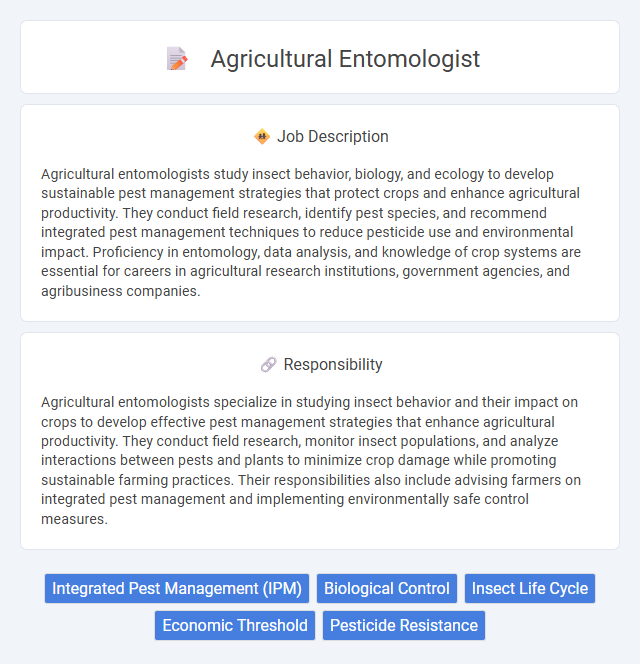
Agricultural entomologists study insect behavior, biology, and ecology to develop sustainable pest management strategies that protect crops and enhance agricultural productivity. They conduct field research, identify pest species, and recommend integrated pest management techniques to reduce pesticide use and environmental impact. Proficiency in entomology, data analysis, and knowledge of crop systems are essential for careers in agricultural research institutions, government agencies, and agribusiness companies.
Individuals with a strong interest in biology, problem-solving skills, and patience are likely well-suited for a career as an agricultural entomologist, given the job's focus on studying insects and their impact on crops. Those who enjoy fieldwork and laboratory analysis may find the conditions stimulating but may face challenges with seasonal outdoor work and detailed data collection. It is probable that people with adaptability and a passion for environmental sustainability will thrive in this role.
Qualification
Agricultural entomologists typically require a bachelor's degree in entomology, agriculture, or a related biological science, with many positions favoring candidates holding a master's or doctoral degree. Key qualifications include expertise in insect identification, pest management strategies, and knowledge of crop production systems. Proficiency in data analysis, research methodologies, and experience with integrated pest management (IPM) techniques are essential for advancing in this field.
Responsibility
Agricultural entomologists specialize in studying insect behavior and their impact on crops to develop effective pest management strategies that enhance agricultural productivity. They conduct field research, monitor insect populations, and analyze interactions between pests and plants to minimize crop damage while promoting sustainable farming practices. Their responsibilities also include advising farmers on integrated pest management and implementing environmentally safe control measures.
Benefit
Agricultural entomologists likely contribute significantly to enhancing crop yields by managing pest populations effectively, which may reduce the need for chemical pesticides and promote sustainable farming practices. Their research could lead to innovations that improve pest resistance in plants, potentially increasing food security and reducing environmental impact. These benefits often translate to economic advantages for farmers and communities dependent on agriculture.
Challenge
Agricultural entomologists likely face complex challenges related to pest resistance and the development of sustainable pest management strategies. The probability of encountering evolving insect populations that impact crop yields may require continuous research and adaptation of control methods. Monitoring environmental impacts of pesticides while ensuring crop protection could also present ongoing difficulties in this field.
Career Advancement
Agricultural entomologists specializing in pest management can advance to senior research positions or lead integrated pest management (IPM) programs within government agencies and private agricultural firms. Expertise in biotechnology and sustainable farming practices often opens opportunities for consultancy roles and academic appointments. Progression typically involves publishing research in scientific journals and obtaining advanced degrees to enhance technical authority and leadership capabilities.
Key Terms
Integrated Pest Management (IPM)
Agricultural entomologists specializing in Integrated Pest Management (IPM) develop and implement sustainable pest control strategies that minimize chemical pesticide use while maximizing crop protection. They conduct field research to monitor pest populations, identify beneficial insects, and apply biological, cultural, and mechanical methods to manage pest threats effectively. Expertise in entomology, ecology, and crop science is essential for optimizing IPM programs that enhance agricultural productivity and environmental health.
Biological Control
Agricultural entomologists specialize in managing pest populations using biological control methods, employing natural predators, parasites, and pathogens to reduce crop damage sustainably. Their research focuses on identifying effective biocontrol agents and integrating them into pest management programs to minimize chemical pesticide use. This approach enhances crop resilience, promotes environmental health, and supports sustainable agricultural practices.
Insect Life Cycle
Agricultural entomologists specialize in studying the insect life cycle, focusing on stages such as egg, larva, pupa, and adult to understand pest behaviors and impacts on crops. Detailed knowledge of metamorphosis and developmental timing enables targeted pest management strategies, reducing crop damage and improving yield. This expertise supports integrated pest management (IPM) practices by identifying vulnerable phases in insect development for effective control.
Economic Threshold
Agricultural entomologists specialize in managing pest populations to protect crop yields by determining the economic threshold--the pest density at which control measures become cost-effective. They conduct field assessments and analyze pest damage to establish these thresholds, ensuring interventions prevent economic loss while minimizing pesticide usage. This approach supports sustainable pest management by balancing pest control costs against potential crop damage.
Pesticide Resistance
Agricultural entomologists specializing in pesticide resistance study insect populations to identify genetic adaptations that reduce pesticide effectiveness, aiming to develop sustainable pest management strategies. They analyze resistance mechanisms, such as enzymatic detoxification and target site insensitivity, to inform the design of integrated pest management (IPM) programs. Their research supports crop protection by minimizing pesticide resistance, improving yield, and reducing environmental impact.
 kuljobs.com
kuljobs.com